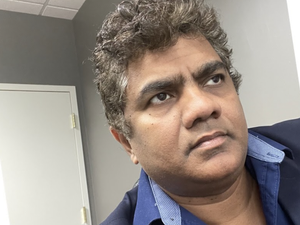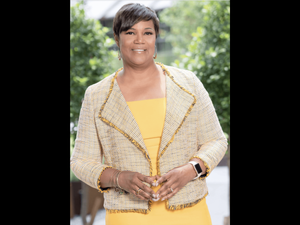In Atlanta, coined "the city too busy to hate," the birthplace of the Civil Rights movement and the home of Black leaders ranging from MLK to Maynard Jackson, it's all about taking action. And Black tech community members are doing just that.
Atlanta Inno sat down with four members of the community who are taking a stand, working for diversity and calling on others to join them. These are their stories.
Make an investment
Shila Nieves Burney, founder of Zane Venture Fund, has hit the ground running since the start of 2020.
In January, she announced Sig Mosley, founder of Mosley Ventures, had joined the fund, which was created to support founders with diverse teams. Earlier this month, Burney announced Zane was in the process of raising a $25 million seed fund with hopes of closing the fund at the end of the third quarter. Zane will supply seed investments ranging between $150,000 and $500,000, with some reserved for Series A follow-on investing.
"We have the data behind us to show it's a great investment opportunity," Burney said. According to Zane, startups with diverse teams are 40 times more likely to succeed. And in a town like Atlanta, there's no lack of diversity -- demographically speaking.
"We’re one of the most diverse regions; we’re very diverse here in terms of not only races, gender, nationalities," she said.
Burney said there's often a misconception that making investments in diversity and inclusion is charity.
"We're not looking for charity," she said. "These founders are working hard."
It's not lost on Burney, who is a Black Latina woman, that many people she works with day to day are white men, who have helped her tremendously. The key to having conversations on diversity and changing the right way is all about intentionality, she said.
"Six months ago, I pitched to an LP and he told me diversity wasn’t differentiative," she said. "My thing is, if I’m going to talk diversity, speak diversity, my team needs to look diverse. A lot of these folks I’ve known for years, we have been intentional about all the advisors on our team, including age, sex, gender, orientation, anything you can think of... It’s about being genuine and intentional for how you’re going to work for someone."
Though conversations for funding have gone well, and Burney has received constant interest in the fund, her biggest fear is not being able to write a check for her startups at the end of their mentoring and training.
"They can’t get capital, I can’t get capital," she said. "That’s unfortunate in this day and age when there’s so much capital in the market."
Beyond mentoring, teaching and networking, Burney said putting money behind these startups --- which are strong, proven successful investments --- is what needs to happen moving forward. Diverse startups need capital to grow and scale their companies, she said.
"I have a duty to make sure you have everything you need to be successful," she said.
Burney said it's about time that economic equality was recognized in this country. Part of Zane's goal is to bridge the gap for economic equality.
"We want equity. Give us the opportunities everyone else is afforded," she said. "We want the same playing field, that everyone else has."

Calling you out
Rodney Sampson has been saying the phrase, "The data don't lie," a lot lately. It's a play on a lyric from Janelle Monáe's song "Q.U.E.E.N." He's referring to the number of founders of color in the Southeast who have received seed capital (or really, the lack of founders). He should know --- he's part of the statistic.
"I was the first Black tech founder in the South to raise a seed round over a million in 2000," he said.
Sampson and his co-founders raised the round for Multicast Media Technologies Inc., which later sold for $24 million in 2010. Since then, Sampson has been one of the biggest Black tech success stories in Atlanta if not the Southeast. He's been an author, served as a partner at TechSquare Labs, created the 100 Black Angels & Allies Fund 1 and co-founded Opportunity Hub, a global ecosystem building platform striving for diversity, equity and inclusion to create racial equity in tech, startups, venture and wealth.
Though Sampson has plenty of accomplishments of his own, he's more concerned about the lack of opportunities given to his fellow founders of color. Since his seed raise in 2000, only 200 Black and Brown founders have raised $1 million or more in seed funding.
"That’s not even one a month," he said.
A month ago, Sampson penned an online op-ed, calling out Atlanta tech ecosystem members, players, incubators, hubs and investors for their silence and lack of change. When Sampson first started Opportunity Hub, he said he went and met with all the major tech players at the time: big names ranging from David Cummings to Stephen Fleming, then director of ATDC.
"I couldn't get any traction at all," he said. "I just started to do it."
"If there ever could be a turning point, this is it. I believe that Atlanta must lead. We have the opportunity."
Opportunity Hub, sometimes described as the Black WeWork, wouldn't be where it is today if Sampson and his wife weren't able to bootstrap the operation.
"We would have never been able to get them off the ground," he said.
Sampson doesn't want other founders of color to deal with the same problems. Despite numerous announcements and commitments for funding and change from organizations across the Atlanta community, they've been more performative than helpful, Sampson said.
"I saw last week that the Metro Atlanta Chamber promised a couple $100,000 in grant funding," he said. "Seriously? Like it just seems so performative to me... In the last two weeks, we've seen more commitments for racial equality come out of Silicon Valley. For Atlanta to be the largest Black tech startup ecosystem in the world and to have no commitments from our tech allies, it's just so disappointing."
The way to make actual change is through entrepreneurship, Sampson said. But the silence from tech community members during a pivotal moment in history for racial equality and justice is deafening.
"I have not heard from any from the VCs in town... I have not heard from any of the accelerators in town..." he said.
Atlanta's top VCs and founders, Sampson said, know and can do better.
"You can't be the largest technology hub in the southeast and not be very intentional about investing and incubating and accelerating Black startups," he said. "I'm calling people out because I was like a lot of those founders --- they don't want to get blacklisted."
Funds like Sampson's, Collab's, Fearless Fund's and Zane Ventures' not being fully committed is a sign Atlanta doesn't want to be a leader in tech, he said.
One of the first ways to drive change is pursuing racial equity in the ecosystem, Sampson said. On Juneteenth, OHUB announced with the help of allies, investors, policy makers, philanthropists and ecosystem builders that it would dedicate $50 million to start racial equity pledges across its early exposure, skills, jobs, startups and capital work. One of the first ways to drive change is pursuing racial equity in the ecosystem, Sampson said. He encourages all throughout the tech community to sign the pledge and make a real commitment.
Making real efforts to add Black members on an executive board, hire Black employees to the C-Suite and procure from Black businesses across Atlanta is how local tech companies can truly make a change, Sampson said.
"I think a lot of companies don't know what to do so they don't do anything but make a performative statement," he said.
Instead, the tech community needs sacrificial action, Sampson said. He calls for community members to sign the pledge, financially invest in organizations like OHUB or other drivers that support Black tech and hire diversely.
White allies are needed to create racial equity across the country for there to be any change, Sampson said.
"I think the reason you’re seeing some people step up… is for the first time in modern day history, White people are fighting an invisible enemy," he said, refering to the pandemic. "For many, racism is an invisible enemy. We need to really understand this and have mutual empathy. This is the time in modern day history to get that right."
When asked if change was truly happening, Sampson said as a person of faith, he's always going to be optimistic.
"If there ever could be a turning point, this is it," he said. "I believe that Atlanta must lead. We have the opportunity. I think we have everything that it takes, people just have to --- they just have to want it. They have to see it form an economic advantage, a human advantage."

Facing challenges
The founders of Qoins, an app that helps consumers pay off their debts and loans while coaching them on how to reach their financial goals, had a long discussion with their team about the current state of affairs in the country, the Black Lives Matter movement and the killing of George Floyd following the first weekend of protests in Atlanta earlier this month.
"With everything that happened on the weekend, that was sitting on everyone's mind," Christian Zimmerman said. "(We decided we needed) to address it as a business, not just as individuals."
After the blog post went live, Zimmerman said the company immediately received cancellation requests because of their support to Black Lives Matter. As of mid-June, the company had received a little less than 100 complaints.
The negative response from some was not a surprise. Zimmerman, who is Latino, and Nate Washington, who is Black, have met challenges as founders and throughout their lives.
"It’s unrealistic to expect that there wouldn’t be some sort of reaction," Washington said. "...There are people out there who feel like asking for rights is a threat to them; you have to take rights from someone else. Obviously that isn’t the case."
Washington said both he and Zimmerman owe it to themselves to take a stand and to back down would be a disservice to his community.
"With so many other large companies, organizations also coming out in support of the movement, I think that these people will realize they’re going to have to boycott everything," Washington said.
Zimmerman said that speaking out against suppression and police brutality isn't about politics or being on the left or right side of the aisle.
"The the problem was someone died and someone died because of someone else," he said.
While some companies and organizations have made commitments for change in the tech world, Washington said some promises weren't all they were cracked up to be. Earlier this month, SoftBank announced a $100 million Opportunity Growth Fund to support founders of color, though the pledge is a small fraction of the company's fund.
"At the end of the day, it’s not what you say, it’s what you do," he said.
Washington's sentiment is another reason why he and Zimmerman thought it was so important to support BLM as a business: he couldn't live with himself if he backed down in the face of oppression. Despite negative experiences with a few customers, Washington said the reaction was mostly positive and the startup has seen support since taking a stand.
"At the end of the day, the people that are going to walk away from our company because of where we stand on this issue, aren’t truly supporters of our company anyway," he said.







